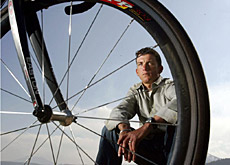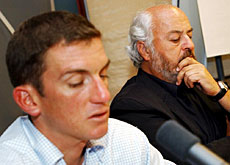Hamilton gets two-year cycling ban for doping

Olympic champion Tyler Hamilton, a former rider with Switzerland’s Phonak cycling team, has been banned for two years after testing positive for blood doping.
The United States Anti-Doping Agency (Usada), which announced the suspension on Monday, said the American had received the maximum ban for a first-time doping offence.
Hamilton has said he will appeal against the decision to the Court of Arbitration for Sport (CAS) in Lausanne.
“This is far from over,” he told the Rocky Mountain News in the United States.
It is the first time Usada has suspended an athlete for the presence of transfused blood, which is used to boost red blood cell counts and increase endurance.
“This decision shows that sport is committed to protecting the rights of all clean athletes and that no athlete is above the rules,” Usada chief executive Terry Madden said in a statement.
The Olympic time-trial gold medallist tested positive at the Tour of Spain last September.
Cloud of suspicion
Hamilton had been under a cloud of doping suspicion since the Athens Olympics, where he tested positive for a blood transfusion on August 18.
However, Hamilton was allowed to keep his gold medal when a second, or “B”, test proved inconclusive because it had been destroyed by being deep-frozen.
Following the Olympics, Hamilton again found himself at the centre of a doping storm when he gave a positive test for blood doping after his Tour of Spain time-trial victory.
Hamilton has always denied using any form of performance-enhancing drugs.
In a statement posted on his website on Monday, the American once again stated that he had “nothing to hide”, casting doubt on the accuracy of testing procedures for blood doping.
“I would never risk my health or my wife’s health for the sake of racing,” he said.
Drug tests
In response to the doping allegations surrounding Hamilton and two other Phonak riders who failed drug tests, the International Cycling Union (UCI) denied the Swiss cycling team a racing licence for this year’s Pro Tour circuit.
Hamilton was fired by Phonak in November, almost a year before his contract was due to expire.
The team’s captain said at the time that he agreed to leave Phonak to improve their chances of competing on the Pro Tour, which includes the Tour de France.
Phonak took its case to the CAS, which partially upheld the appeal, awarding a two-year licence. The team had originally sought a four-year licence.
Delivering its ruling in February, the court said it believed Phonak had acted immediately and carried out correct procedures when news of the positive tests broke.
Hamilton was once considered as a possible successor to six-time Tour de France winner Lance Armstrong, who announced on Monday that he would retire at the end of this year’s race. The two were former teammates on the United States Postal Service team.
Hamilton finished fourth in the 2003 Tour de France despite racing most of the stages with a broken collarbone.
swissinfo with agencies
Three Phonak riders tested positive for doping last year: Hamilton, Santiago Perez and Switzerland’s Oscar Camenzind.
Former world champion Camenzind was banned for two years and retired from the sport in August last year.
Perez, who tested positive for blood doping, also received a two-year ban.
Hamilton was born in Massachusetts in 1971 and began riding professionally for the Montgomery Belle team in 1995
He joined the US Postal Service team in 1996, moved to CSC Tiscali in 2002, before signing for Phonak.
During his career he has won 20 titles and stage victories, including the Tour of Denmark (1999), the Dauphine Libere (2000), Liège-Bastonne-Liège and the Tour de Romandie (2003), and the Olympic time trial in Athens.
He has ridden in the Tour de France 8 times.

In compliance with the JTI standards
More: SWI swissinfo.ch certified by the Journalism Trust Initiative










You can find an overview of ongoing debates with our journalists here . Please join us!
If you want to start a conversation about a topic raised in this article or want to report factual errors, email us at english@swissinfo.ch.